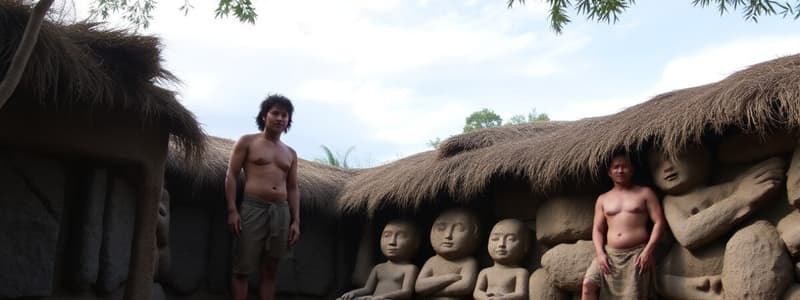Podcast
Questions and Answers
What is the primary function of the kitchen in the Bahay Kubo?
What is the primary function of the kitchen in the Bahay Kubo?
- Prayer space
- Cooking and eating area (correct)
- Storage of sleeping quarters
- Place for visitors to gather
Which traditional material is commonly used for cooking utensils in a Bahay Kubo?
Which traditional material is commonly used for cooking utensils in a Bahay Kubo?
- Plastic
- Wood
- Metal
- Bamboo (correct)
What is a key design feature of Muslim architecture mentioned in the content?
What is a key design feature of Muslim architecture mentioned in the content?
- Flat roofs for rain collection
- Open floor plans for communal living
- Large windows for ventilation
- Domes topped with inverted jars (correct)
How does the concept of Tawhid relate to the Muslim view of the universe?
How does the concept of Tawhid relate to the Muslim view of the universe?
What type of call to prayer instrument is used in traditional Muslim practice?
What type of call to prayer instrument is used in traditional Muslim practice?
Which structure is a common outdoor space in a traditional Muslim complex?
Which structure is a common outdoor space in a traditional Muslim complex?
What is the purpose of the Minbar in a mosque?
What is the purpose of the Minbar in a mosque?
Which of the following is NOT a typical use of the bamboo boxes in Bahay Kubo?
Which of the following is NOT a typical use of the bamboo boxes in Bahay Kubo?
What is a defining feature of the Bahay na Bato?
What is a defining feature of the Bahay na Bato?
What purpose does the Zaguán serve in the Bahay na Bato?
What purpose does the Zaguán serve in the Bahay na Bato?
Which statement correctly describes the traditional materials used in the Bahay na Bato?
Which statement correctly describes the traditional materials used in the Bahay na Bato?
In what ways does the Bahay na Bato reflect cultural significance?
In what ways does the Bahay na Bato reflect cultural significance?
What does the term Langgal refer to in traditional worship structures?
What does the term Langgal refer to in traditional worship structures?
Which characteristic is associated with the seating area of Philippine mosques?
Which characteristic is associated with the seating area of Philippine mosques?
What is the primary function of the CUADRA in the Bahay na Bato?
What is the primary function of the CUADRA in the Bahay na Bato?
How is the traditional mosque, or Masjid, primarily distinguished from minor worship structures?
How is the traditional mosque, or Masjid, primarily distinguished from minor worship structures?
What is the primary construction material used in vernacular architecture according to the provided content?
What is the primary construction material used in vernacular architecture according to the provided content?
Which of the following features is NOT characteristic of vernacular architecture?
Which of the following features is NOT characteristic of vernacular architecture?
What is the primary function of the 'Datag' structure described in the content?
What is the primary function of the 'Datag' structure described in the content?
Which term refers to the shelter built by Tau’t Batu people that may accommodate multiple families?
Which term refers to the shelter built by Tau’t Batu people that may accommodate multiple families?
The term 'Vernacular' is derived from which Latin word meaning native or homegrown?
The term 'Vernacular' is derived from which Latin word meaning native or homegrown?
What aspect of vernacular architecture ensures suitability to a geographical environment?
What aspect of vernacular architecture ensures suitability to a geographical environment?
Which of the following structures is characterized by its low wooden houses on steep terrain?
Which of the following structures is characterized by its low wooden houses on steep terrain?
What does the 'Muyong' serve as in the context of vernacular architecture?
What does the 'Muyong' serve as in the context of vernacular architecture?
What is the purpose of a lean-to in the context of nomadic architecture?
What is the purpose of a lean-to in the context of nomadic architecture?
The architectural structure known as 'Palawan's rice terraces' primarily represents what type of heritage?
The architectural structure known as 'Palawan's rice terraces' primarily represents what type of heritage?
Which of the following is a characteristic of the 'Bahay Kubo' structure?
Which of the following is a characteristic of the 'Bahay Kubo' structure?
What type of leadership structure typically exists in a barangay?
What type of leadership structure typically exists in a barangay?
What does the term 'kabilang buhay' signify in the cultural context?
What does the term 'kabilang buhay' signify in the cultural context?
What does the 'post-beam' method signify in traditional construction techniques?
What does the 'post-beam' method signify in traditional construction techniques?
Study Notes
Callao Man and Homo Luzonensis
- Evidence of human presence in the Philippines dates back to at least 67,000 years ago.
- Homo luzonensis, a distinct species of human, has been identified from fossils found in Callao Cave.
- Homo luzonensis demonstrates the capability of crossing open waters, suggesting early human migration patterns.
Ancient Filipino Societies
- Tau’t Batu people inhabited the southern part of Palawan, likely sheltering multiple families.
- Datag, a basic sleeping platform, served as a temporary dwelling for the indigenous people.
- Datag construction involved tree branches, dried leaves, and a raised platform slightly above ground.
Early Architectural Forms
- Petroglyphs, prehistoric drawings engraved on cave walls, offer insight into early human life.
- Nomadism played a pivotal role, leading to the development of ephemeral portable architecture.
- Lean-to structures, a foundational building practice, served as temporary shelter.
Rice Terraces: A Prehistoric Megastructure
- Rice terraces, found in high altitudes from 500-1600 meters, demonstrate remarkable engineering.
- Payoh refers to the terraced paddies, while Muyong represents woodland reservations serving as watershed areas.
Maritime Barangganic Societies
- Social order was centered around the barangay, a boat-based or small political unit.
- Kabangka (kabarangay) refers to the community's boat, suggesting the importance of seafaring.
- Kabaong, shaped like a bangka (boat), reflects the strong connection to the maritime world.
- Barangay encompassed broader political, economic, and religious aspects beyond the family structure.
Vernacular Architecture
- Vernacular architecture encompasses indigenous, folk, tribal, ethnic, or traditional building styles found within different communities.
- These structures include granaries, fortifications, places of worship, ephemeral structures, and shanties.
- Vernacular architecture highlights the use of natural materials and adaptation to the local environment.
The Balai: A Southeast Asian Architectural Heritage
- The balai, a traditional house design prevalent in non-Hispanic, non-Anglo-Saxon communities, is considered foundational to Philippine architecture.
Austronesian Building Heritage
- Austronesian building heritage reflects the aquatic cultural network of the Asia-Pacific region.
Traditional Materials and Construction Techniques
- Organic materials like wood, bamboo, palm leaves, grass thatch, and plant fibers formed the building blocks of vernacular architecture.
- The post-beam method of construction serves as a common technique.
Moonsoon Frontiers: Ivatan Houses
- Chivuvuhung, low houses constructed from wood, bamboo, and thatch, were adapted to steep terrain in mountainous regions.
- Sleeping quarters were often constructed of wood or bamboo, while palay boxes served as benches and storage.
Muslim Architecture
- Islamic theology influences all aspects of Muslim life, including architecture.
- The mosque, also known as masjid, is a central place of worship in Islam.
- The unique shape of early mosques draws inspiration from early Christian churches and Middle Eastern courtyard houses.
Philippine Muslim Concept of Space
- The Tawhid, meaning "Unity of Allah," underpins the Muslim concept of space.
- The Muslim view of the universe is intertwined with the Tawhid, emphasizing God as the origin of all things.
- Mecca and the Ka'aba serve as the focal point, orienting all mosques (masjids) towards the Kibla.
Building Types: The Mosque
- Langgal (Tausug and Yakal) or Ranggal (Maranao) are small temporary chapels built for worshippers far from the main masjid.
- Masjid or Maskid are more permanent structures, ideally built near water, with stone foundations.
Peculiar Characteristics of Philippine Mosques
- Outdoor seating areas often replace enclosed courtyards with ablution fountains.
- The call to prayer is done inside with the use of hanging drums called tabo, jabu-jabu, or dabu-dabu.
The Minbar and Islamic Theology
- The Minbar, an elevated platform or chair, serves as a pulpit in the mosque.
- The prominence of the Minbar in Philippine mosques is often less accentuated compared to those in Africa and the West.
- Islamic theology emphasizes the five pillars of Islam: Shahada, Salat, Siyam, Zakat, and Hajj.
Mosque Ornamentations
- The crescent and star ornamentation surmounts bulbous domes, a signature element of Islamic architecture.
- Okir carving and burak (winged centaur) are key decorative elements.
- Inverted jars placed at the apex of domes are a distinctive feature found in Lanao Mosques.
The Madrasa
- The Madrasa, derived from the Arabic word darasa, serves as a place of learning for Islamic knowledge.
- It originated from 10th Century domestic courtyards in Khurasan (Iran).
- The Madrasa is often built as part of a mosque complex, housing Koranic, philosophical, and administrative law studies.
Muslim Secular Architecture
- Forts and royal residences are significant examples of Muslim secular architecture.
- Kota, indigenous fortifications, are constructed from palm trees and wooden posts filled with earth.
Bahay na Bato (Spanish Antillian House)
- The bahay na bato, characterized by its two-storey structure with a volada (overhanging upper floor), reflects Spanish Antillian architectural influence.
- The ground floor includes a zaguan (carriage and saints' float storage), a cuadra (horse stable), a bodega (storage), and an entresuelo (mezzanine).
- The entresuelo, accessible only to the master of the house, served as an office or a private bedroom.
- The bahay na bato represents a synthesis of indigenous and European influences.
Studying That Suits You
Use AI to generate personalized quizzes and flashcards to suit your learning preferences.
Related Documents
Description
Explore the fascinating history of human presence in the Philippines, including the discovery of Homo luzonensis in Callao Cave. Learn about ancient Filipino societies, their living structures, and the significance of early architectural forms in understanding their way of life.





